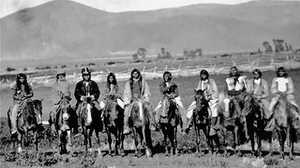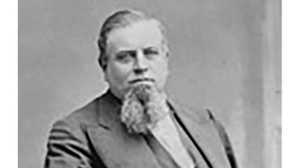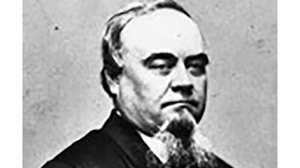Collis P. Huntington

Collis Huntington had a preternatural sense for buying and selling. He came to California in 1849 at news of gold. He found success vending supplies to men chasing their fortunes in icy streams. Despite a rough start, he established himself in Sacramento by the turn of the decade. Soon he had a hardware store at 54 K Street, next to merchant Mark Hopkins. Huntington took Hopkins on as partner.
A Tantalizing Opportunity
His involvement in the Republican Party induced an interest in the railroad issue. In November 1860 Huntington attended a lecture on the subject. Afterward he invited the speaker to meet in private. The scheme laid out by Theodore Judah tantalized the storekeeper. Judah's survey enabled construction of a wagon road into Nevada Territory, on which Huntington could charge tolls. Better yet, the new Republican administration might reward the survey and subsequent lobbying efforts with the keys to the Pacific railroad. Huntington sensed a fantastic opportunity. If he was wrong, he'd still have the wagon road. There was little to lose. Huntington agreed to invest and brought in Hopkins, Leland Stanford, and Charles Crocker to do the same. From this initiative sprang the Central Pacific Railroad Company.
Pride and Conflict
Huntington's experience as a businessman made him a master calculator with a hardened exterior. Inside raged a fierce pride that did not easily forget its wounding. He did not hide displeasure when overlooked for the presidency of the Central Pacific. The decision led to a fracture with Judah, whose severance from the railroad Huntington implicitly encouraged. Over the years, tensions grew with friends as well. Conflicts came to a head when former governor Stanford, acting as the Central Pacific's emissary to Utah Territory, ignored Huntington's entreaties to grab the Wasatch coal fields.
Buying Influence
Huntington filled the crucial role of Central Pacific lobbyist. He became a frequent visitor to Washington, where he midwifed railroad legislation. Like the Union Pacific's man in Washington, Oakes Ames, Huntington sprinkled money around the Capitol. He donated thousands of dollars to campaigns, retained legislators as attorneys, and put lobbyists on the Central Pacific payroll. Huntington enjoyed backroom politics, but he was cautious. He could easily sense the impact Union Pacific's questionable finances and the Crédit Mobilier's movements had across Capitol Hill. "As the Union Co. are so very corrupt it has to a considerable extent demoralized the Road being built under the Pacific R.R. Act," he cautioned partner E.B. Crocker, "and I should not be surprised if Congress should order a committee to overhaul all the Co's., and while I know everything is All Right with the C.P. I would be very careful that the Co's. Books should make it plain that any one could so see it." Huntington would never be punished for distributing favors, much less caught. In 1873 he regretfully informed Congressional investigators that the Central Pacific books, though All Right, had been destroyed when the company moved offices.
A Crafty Ruse
Huntington delighted in vexing the Union Pacific where he could. He maintained an espionage network, frequently updating California colleagues on their competitor's progress and problems. A born persuader, he was also crafty. When pressuring Secretary of the Interior Orville Browning to approve his proposed Utah line, Huntington commuted between New York and Washington every day for a week, so as not to betray his effort on Capitol Hill. He was in his New York office every morning and home again every night. A typical example of his determination, the ruse blinded competitors to his efforts. In the race to acquire Utah territory he was cutthroat. Grossly misrepresenting Central Pacific headway, he snatched ownership of the town of Ogden from under the nose of the Union Pacific.
Founder of an Empire
Living on an empire founded on the success of the Central Pacific, Huntington outlasted all his former Associates. He died in 1900, at the turn of the century his railroad project had helped to usher forward.







